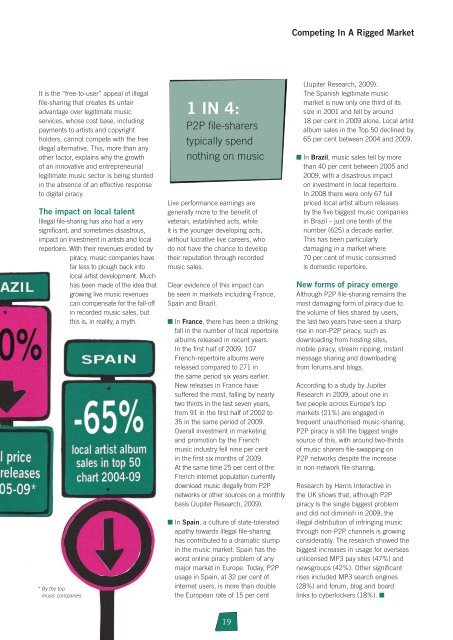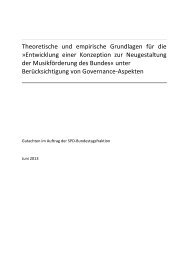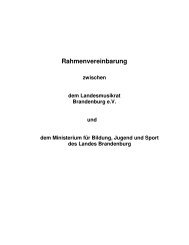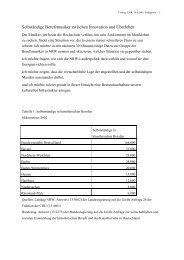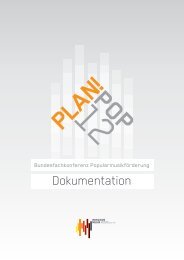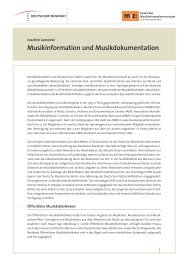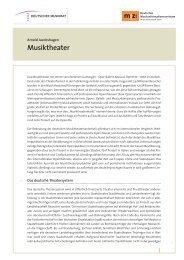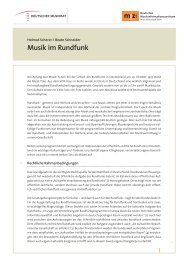You also want an ePaper? Increase the reach of your titles
YUMPU automatically turns print PDFs into web optimized ePapers that Google loves.
It is the “free-to-user” appeal of illegal<br />
file-sharing that creates its unfair<br />
advantage over legitimate music<br />
services, whose cost base, including<br />
payments to artists and copyright<br />
holders, cannot compete with the free<br />
illegal alternative. This, more than any<br />
other factor, explains why the growth<br />
of an innovative and entrepreneurial<br />
legitimate music sector is being stunted<br />
in the absence of an effective response<br />
to digital piracy.<br />
The impact on local talent<br />
Illegal file-sharing has also had a very<br />
significant, and sometimes disastrous,<br />
impact on investment in artists and local<br />
repertoire. With their revenues eroded by<br />
piracy, music companies have<br />
far less to plough back into<br />
local artist development. Much<br />
has been made of the idea that<br />
growing live music revenues<br />
can compensate for the fall-off<br />
in recorded music sales, but<br />
this is, in reality, a myth.<br />
* By the top<br />
music companies<br />
1 IN 4:<br />
P2P file-sharers<br />
typically spend<br />
nothing on music<br />
Live performance earnings are<br />
generally more to the benefit of<br />
veteran, established acts, while<br />
it is the younger developing acts,<br />
without lucrative live careers, who<br />
do not have the chance to develop<br />
their reputation through recorded<br />
music sales.<br />
Clear evidence of this impact can<br />
be seen in markets including France,<br />
Spain and Brazil.<br />
n In France, there has been a striking<br />
fall in the number of local repertoire<br />
albums released in recent years.<br />
In the first half of 2009, 107<br />
French-repertoire albums were<br />
released compared to 271 in<br />
the same period six years earlier.<br />
New releases in France have<br />
suffered the most, falling by nearly<br />
two thirds in the last seven years,<br />
from 91 in the first half of 2002 to<br />
35 in the same period of 2009.<br />
Overall investment in marketing<br />
and promotion by the French<br />
music industry fell nine per cent<br />
in the first six months of 2009.<br />
At the same time 25 per cent of the<br />
French internet population currently<br />
download music illegally from P2P<br />
networks or other sources on a monthly<br />
basis (Jupiter Research, 2009).<br />
n In Spain, a culture of state-tolerated<br />
apathy towards illegal file-sharing<br />
has contributed to a dramatic slump<br />
in the music market. Spain has the<br />
worst online piracy problem of any<br />
major market in Europe. Today, P2P<br />
usage in Spain, at 32 per cent of<br />
internet users, is more than double<br />
the European rate of 15 per cent<br />
19<br />
Competing In A Rigged Market<br />
(Jupiter Research, 2009).<br />
The Spanish legitimate music<br />
market is now only one third of its<br />
size in 2001 and fell by around<br />
18 per cent in 2009 alone. Local artist<br />
album sales in the Top 50 declined by<br />
65 per cent between 2004 and 2009.<br />
n In Brazil, music sales fell by more<br />
than 40 per cent between 2005 and<br />
2009, with a disastrous impact<br />
on investment in local repertoire.<br />
In 2008 there were only 67 full<br />
priced local artist album releases<br />
by the five biggest music companies<br />
in Brazil – just one tenth of the<br />
number (625) a decade earlier.<br />
This has been particularly<br />
damaging in a market where<br />
70 per cent of music consumed<br />
is domestic repertoire.<br />
New forms of piracy emerge<br />
Although P2P file-sharing remains the<br />
most damaging form of piracy due to<br />
the volume of files shared by users,<br />
the last two years have seen a sharp<br />
rise in non-P2P piracy, such as<br />
downloading from hosting sites,<br />
mobile piracy, stream ripping, instant<br />
message sharing and downloading<br />
from forums and blogs.<br />
According to a study by Jupiter<br />
Research in 2009, about one in<br />
five people across Europe’s top<br />
markets (21%) are engaged in<br />
frequent unauthorised music-sharing.<br />
P2P piracy is still the biggest single<br />
source of this, with around two-thirds<br />
of music sharers file-swapping on<br />
P2P networks despite the increase<br />
in non-network file-sharing.<br />
Research by Harris Interactive in<br />
the UK shows that, although P2P<br />
piracy is the single biggest problem<br />
and did not diminish in 2009, the<br />
illegal distribution of infringing music<br />
through non-P2P channels is growing<br />
considerably. The research showed the<br />
biggest increases in usage for overseas<br />
unlicensed MP3 pay sites (47%) and<br />
newsgroups (42%). Other significant<br />
rises included MP3 search engines<br />
(28%) and forum, blog and board<br />
links to cyberlockers (18%). n


